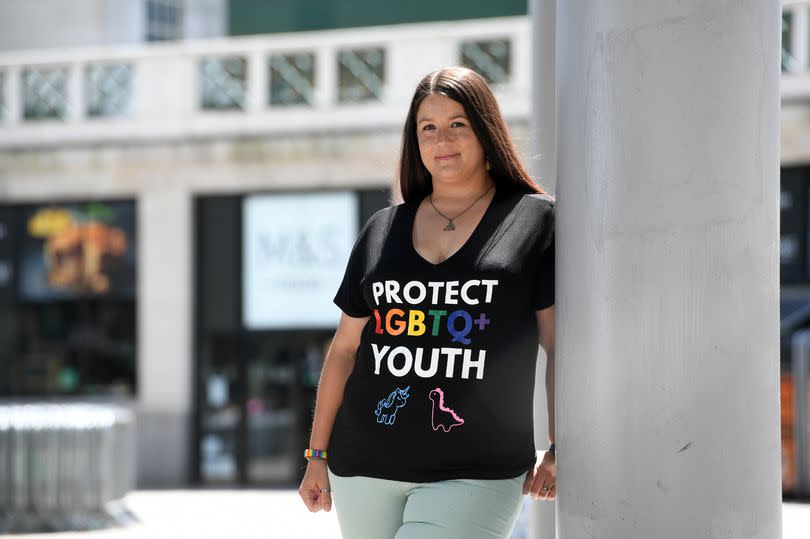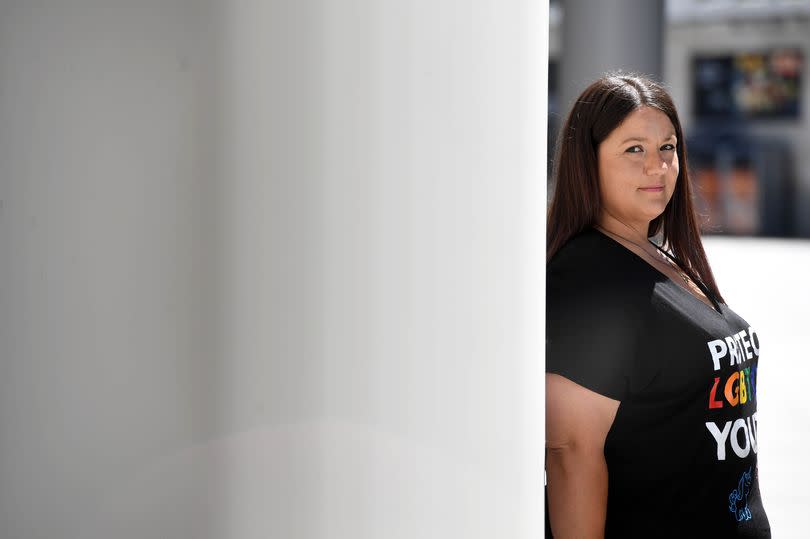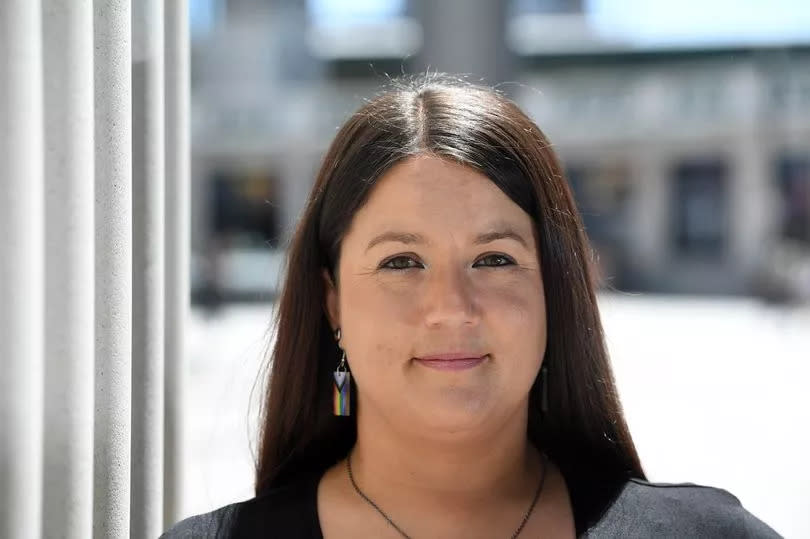'We get negative vibes holding hands... but it's important to show young LGBTQ+ people there are people like them'

Sarah Maslen and her fiancé Sian often joke about being the only gays in the village. In Llanelli, Carmarthenshire, Sarah tells of funny looks they often get when holding hands on the school run to collect their four children - one aged nine and two aged 11 and one 13.
“Visibility matters,” Sarah says. “We’ll get looks and we’ll get negative vibes, but we’ll also get people clocking us holding hands and smiling. We get plenty of teenagers who look and you can read their faces. They’re thinking: ‘That’s someone like me.’ To me that’s really powerful and well worth the negativity we sometimes get. I grew up in a very Christian household not feeling I belonged, so I think it's important to show young LGBTQ+ people that there are people like them right beside them in their communities.”
Sarah grew up in a boarding school where her parents worked and she then taught in one for 13 years, realising the lack of support for LGBTQ+ people within a strict school system. “I didn’t feel it was safe to come out when I was young and there I was, now as an adult years later working with these young people and I was acutely aware that they didn’t feel safe to come out in their environment either. Something had to change. I started with myself and went for training to try and understand more about LGBTQ+ people generally, particularly trans and non-binary people. For the latest Welsh news delivered to your inbox sign up to our newsletter
READ MORE: 'People used to make their excuses and move away when I told them what we were doing'
“I went back and reassessed the school’s practices and made some curriculum changes in that school to make sure it was more inclusive. I spoke to a lot of LGBTQ+ teachers and young people about their experiences in schools and realised that actually it wasn't just that school that needed changing but there are young people everywhere that need this.”
She set up Undivided Training and Consultancy - her own training service to help people understand issues around challenges facing LGBTQ+ young people. After years of experience working with LGBTQ+ forums, helplines and youth groups, she wanted to make even more of a difference to the lives of young queer people. Alongside her many ongoing roles supporting queer and non-queer vulnerable people she now offers workshops at a time where many feel they need support. She is contacted by parents of young LGBTQ+ people, schools, organisations, charities, councils, and even churches too. Her multi-faceted career and voluntary roles earned her third place on the Pinc List for 2024.
“There is often a grieving process for parents, especially when their child comes out as trans or non-binary or gender diverse, because there is an element where you do have to grieve the child that has gone,” Sarah says. “That isn’t to say you’re not accepting and happy to celebrate the child in front of you. It’s very normal for all parents to think about where their children will end up and it’s easy to imagine a certain life for them in a heteronormative world.
It doesn’t mean they’re not accepting if that doesn’t turn out to happen. It’s terrifying to be a parent of a young trans person right now. Generally parents ultimately want the best for their children, but there are so many barriers to that happening at the moment if your child is trans. My work as an executive director of Trans in the City is trying to open doors and build bridges for young adults who are trans, non-binary and gender diverse through our student ambassador and mentoring schemes. It's quite pioneering but is very impactful and it's an honour to work with such talented individuals.
“The first time I worked with a church it was very emotional for me because it brought out stuff I hadn’t really dealt with in my own mind about growing up as a lesbian in a religious environment. I was surrounded by people from a very young age vehemently against my existence as a queer person, which was incredibly hard. It was only when I went to college at 18 that I met people who were out and that was completely new and liberating for me.”

Churches across Wales are now approaching Sarah for advice in helping their young LGBTQ+ people and their families. “It’s increasing partly because they have people in their congregations who are coming out, or they have parents who have children who are coming out or have come out,” Sarah explains. “Many of the churches I work with don’t want to close the door on these people. They understand that those people probably need them more than ever. I think that really drives them to want to make their church a safe space for all.
“I try to say, ‘Let’s look at what the Bible says as we know it now.’ There is no hierarchy in sin. It’s not for us to judge, and Jesus first taught love and acceptance of everyone. Jesus was the person who met with the vulnerable and the outcast and was the kind of person who would have been with us at pride as an ally. People will have their own beliefs within that and I’m not setting out to change those beliefs - I don’t feel like that’s my right or responsibility. I think it’s more a case of trying to plant seeds in minds and help people to understand the queer community better and give organisations like churches the tools they need to keep those doors open to people who need them the most.”
Sarah says many schools and teachers have approached her for help in teaching pupils about relationships and sexual education. The new RSE curriculum teaches pupils about same-sex families and what different sexualities and gender identities mean. It sparked protests by a vocal minority who claimed young people were learning about gay sex and “trans ideology”, which is false.
“We are still living in the shadow of section 28 where we couldn’t teach anything about homosexuality in our schools or even mention it,” Sarah says. “So many teachers just want to get it right for our young people. Most teachers and schools that come to me are usually just very concerned about getting it wrong or saying the wrong thing. Teachers are still very aware it’s a very challenging subject to teach and within the education sector it’s really fraught at times.
“Just like there’s a mass of misinformation about the trans community online, there is also a mass of misinformation about the relationship and sexual education curriculum. It’s not even close to young people being taught about gay sex or primary school children being told about different gender identities. The curriculum is about teaching inclusion, equality and respect. Some of my training is about giving teachers the tools to deal with those accusations.
“As a young person sitting in a classroom learning how to put condoms on fake penises just compounded that feeling of not belonging. There will be plenty if not all students in any classroom who know a lot about LGBTQ+ people and probably know of people within that classroom who might be queer. So the curriculum is about avoiding that constant heteronormative narrative. It’s also not just about LGBTQ+ people but about how someone’s race, religion, or culture can impact their relationships. It’s about inclusivity and compassion and telling young people they are seen and respected whoever they are.”
READ MORE: Cardiff City star Mahlon Romeo issues statement after homophobic rant at police officer
READ MORE: ‘They think we’re a different species’: What people marching at Pride Cymru said about politicians

After taking up a position as manager of Fast Track Cymru - an HIV preventative organisation aiming to achieve zero HIV transmissions in Wales by 2030 - it’s a wonder she has enough hours in the day. “I get that a lot,” she laughs. “My Fast Track management job is full time so it takes up a large chunk of my week, but I absolutely love it. It’s very rewarding. Fast Track is a national organisation and there’s a group working alongside each health board in Wales. There’s a large number of people involved in Fast Track including volunteers who are gay men. But HIV is certainly not a gay disease and we’re working very closely with lots of different communities - particularly different ethnicities."
The most recent UK-wide estimate is that 106,890 people are living with HIV in the UK in 2019. Sixty people were known to be diagnosed with HIV in Wales in 2021. A large proportion of people who contract HIV are still LGBTQ+ people, but the figures in that bracket are coming down, while among other demographics the numbers are increasing. In England in 2021 the number of new diagnoses increased by 3% in gay and bisexual men and by 9% in women exposed by heterosexual contact.
“There’s definitely still a stereotype there that HIV is something only gay men should worry about, but that’s not true," Sarah adds. "For example, the figures for heterosexual women are increasing. At the moment gay men tend to have a more rounded understanding of HIV and things like PrEP (HIV pre-exposure medication).
“Lisa Power, who I took over from, told me once you start working in sexual health you’ll never truly leave it, and I think she’s spot on. My passion for sexual health came from teaching in schools and making sure those lessons were inclusive. Now I’m working with the Welsh National Opera to create a resource pack for schools which is all about HIV prevention and being able to combine my passion for inclusive education with spreading awareness around HIV.
“I think Fast Track succeeds because we connect really passionate people who have different expertise. It's a very open and forward-thinking organisation. I, for example, don’t have a clinical background, but some are from clinical backgrounds and when they’re combined with people living with HIV and people working within sexual health as well as third sector organisations and local authorities we can do brilliant things.
“It wasn’t that long ago I couldn’t be my true self in any form of my life. Now, in every walk of my life, even though it might be challenging, I get to be myself. I’ll never take that for granted.”

 Yahoo News
Yahoo News 
